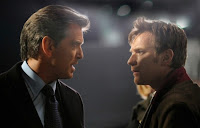 At this point, I should not be surprised to see a Danny Boyle film that starts and begins with action. Or, in the case of “Trainspotting,” begins in the middle of action. That’s the pace of the film, the mood of the film, and the setting of the film, all introduced in a few short seconds. If you can’t keep up, you were never meant to watch this film. If you can, be prepared for one of the most rewarding viewing experience you might ever have.
At this point, I should not be surprised to see a Danny Boyle film that starts and begins with action. Or, in the case of “Trainspotting,” begins in the middle of action. That’s the pace of the film, the mood of the film, and the setting of the film, all introduced in a few short seconds. If you can’t keep up, you were never meant to watch this film. If you can, be prepared for one of the most rewarding viewing experience you might ever have.
“Trainspotting” was the breakthrough film of the energized British mind of Danny Boyle, perhaps best known for “Slumdog Millionaire.” Here, the slums of Mumbai are replaced by the drug scene of Edinburgh, Scotland. Boyle focuses on a small group of heroin addicts, who live as a small, twisted, alternate family.
The circle of friends include the timid Spud (Ewen Bremner), honest Tommy (Kevin McKidd), almost pensive Sick Boy (Jonny Lee Miller), borderline psychotic Begbie (Robert Carlyle), and Mark Renton (Ewan McGregor). Renton is the film’s central character. The film mainly follows his quest from junkie to ordinary man. His conflict is to make it to sobriety without being pulled back into the past.
“Trainspotting” proves that Boyle brings a level of energy and thrill to cinema that few directors nowadays can match. He can achieve this high level of energy simply by tilting a camera, or adding a little light to a room. It might just be a way to shine a little bit of hope into a hopeless world. However, this doesn’t mean Boyle is attempting to beautify horror. He never justifies his characters’ actions. The film is meant to portray the world inside the mind of a heroin addict, and maybe one person might just beauty in their own mind where others see trash.
Boyle will always remain in my mind a brilliant visual director. He just truly knows what a good image would look like. And while some visual directors opt forr long stretches of silence, Boyle can let soliloquies run long over stunning images with no sense of distraction. Both of these things make one of those combos that just inexplicably work so well together. Boyle is the rare director who can be in-your-face without being annoyingly intrusive.
While Boyle is overwhelmingly a visual director, he still can stay in touch with emotion. Through many odd, trippy sequences, Boyle explicitly shows the inner workings of a drug experience. Then, he shows how these experiences have the power to dehumanize and tear people apart.
Of all the characters in the large ensemble of “Trainspotting,” Renton is without a doubt the most important, and the most deep. He is the one character the audience can cling onto emotionally because he is the only one seems to have the ability to change. Renton is extremely dark; he rejects every aspect of materialism along with his own heritage. He doesn’t seem to do drugs out of addiction but rather out of the pure thrill of life. He definitely adheres to the quote that opens up “Fear and Loathing in Las Vegas”: “He who makes a beast of himself gets rid of the pain of being a man.”
The inner pains of Renton are brought out by the outstanding performance of McGregor. He disappears into his role and never steps out of it. He shows an untrustworthy inner demon. Yet, his capacity to change is utterly believable.

Some might compare “Trainspotting” to a modern film about the effects of drugs such as “Requiem for a Dream.” However, I will instead compare it to one of cinema’s greatest masterworks: “A Clockwork Orange.” I am not saying “Trainspotting” is as good as “A Clockwork Orange,” but I can feel that Boyle was trying to emulate Kubrick’s classic and he does so well. The large white walls that engulf characters, the aloof parents, and the endless graffiti feels totally reminiscent of the world of Alex DeLarge.
Like “A Clockwork Orange,” “Trainspotting” is about the possibility or impossibility of change in a world that’s in a constant state of moral decay. This is a film that tells the typical anti-drug fable with a hip new eye. Sometimes that’s just what the greatest movies are, they ones that tell the stories we’ve heard millions of times before and makes them brand new. Oh, and in the case of “Trainspotting,” simply brilliant.

